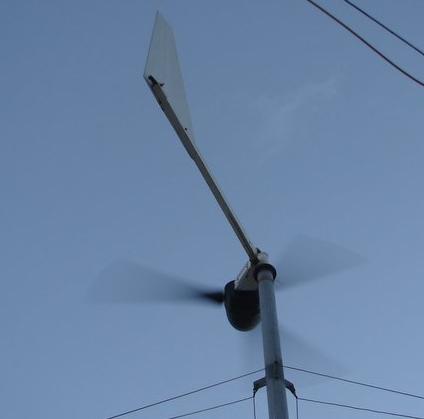| Author |
Message |
moprmac
Newbie

Joined: 12/03/2010
Location: Posts: 3 |
| Posted: 03:53pm 11 Mar 2010 |
 Copy link to clipboard Copy link to clipboard |
 Print this post |
|
Hello all,
I have been reading tons of info the past month, but still have no focus on where to start. It is great to see so many people building something with extra parts or making there own, but the result vary extremely.
I am wondering where to focus. Assuming that performance and power is the goal, using battery storage, and about a class 2 wind area, what are your thoughts. I want to power the house - off grid.
Building skill is not the issue. Basically what gives you the most bang for the buck?
1. Build an axial from Piggott plans - ?watt
2. Build a F&P - ?watt
3. Buy a ?
Thanks for your thoughts,
Ed
|
| |
niall1

Senior Member

Joined: 20/11/2008
Location: IrelandPosts: 331 |
| Posted: 08:40pm 11 Mar 2010 |
 Copy link to clipboard Copy link to clipboard |
 Print this post |
|
Hi Ed
powering the house off grid is a noble challenge... i,ve great admiration for anyone that tries to live off grid
maybe option no 4. could be how suitable the house requirements are and what sacrifices and lifestyle changes your prepared to make but i,m sure your already thinking about this
option no 0. could be what wind is actually available at the site
i try to run one of Hughs 3.6m machines on whats a pretty (being kind) unsuitable wind site ...it would have capibility to run a laptop , a few lights , watch the odd movie or two , a lot of fun but not a magic bullet for free power ..saving a kilowatt hour of power seems a lot easier than generating one
wind combined with solar seems to give a better balanced approach ....but the cost goes up
i wish i knew the solution...
niall
Edited by niall1 2010-03-13
niall |
| |
GWatPE

Senior Member

Joined: 01/09/2006
Location: AustraliaPosts: 2127 |
| Posted: 11:21pm 11 Mar 2010 |
 Copy link to clipboard Copy link to clipboard |
 Print this post |
|
What is a class2 wind area??
Average daily windspeed, and wind distribution throughout a year are the numbers you need. Any OFF GRID system will need to be a hybrid, of possibly windmill, solar panels, micro hydro if available, Veg-oil generator, Fossil fuel generator, as the Recharging source, and a battery, and Inverter to supply all loading.
I have seen many installations. The most successful have at least 2 RE recharging sources, combined with a battery inverter and reliable auto starting Genset. Most long term reliability balances on the genset. There will be times when the RE is insufficient for the loading and the battery storage will run out.
The trouble with most systems not meeting the loading is usually associated with the occupants needing more power than is sustainable.
It is very important to err on the side of over estimating loads. The efficiency, and more important the total consumption of the loads is needed. The effect of loss of any recharging component to failure should be considered.
I have not seen any successful single source RE, OFF GRID setup.
Businesses that specialize in these systems have elaborate proprietry formulae to tailor a system.
Most systems will need considerably more generating capacity than expected. The GENSET reduces the required battery sizing, as does the excess of RE, and the diversity of RE sources.
The key to a manageable system is making it smaller. As Niall, has stated, "..saving a kilowatt hour of power seems a lot easier than generating one"
It not only seems easier, but makes good economic and logistical sense.
OFF GRID RE setups are notoriously inefficient users of the RE infrastructure. As much as 50-75% of the available RE is not storable, at times during the year, and at other times there may be a shortfall of a similar amount.
The battery capacity plays a major part. It usually is a tradeoff with battery cost v RE source costs.
You need an exceptional wind site to be sustainable with wind only.
Gordon.
become more energy aware |
| |
moprmac
Newbie

Joined: 12/03/2010
Location: Posts: 3 |
| Posted: 01:21am 12 Mar 2010 |
 Copy link to clipboard Copy link to clipboard |
 Print this post |
|
Thanks for the replies. I definitely understand that combined sources and reducing is much easier than producing.
More of what I meant was where to start for the windmill in particular. For example, in Hugh's book "A wind Turbine Recipe" book it states that the 4200mm diameter turbine can produce 1000 Watts and 502 kWh in a month at 7m/s. A page here says the F&P can produce 300 Watts.
So why bother with the F&P?
Not to say that anyone's choices are good or bad, but I am trying to figure out where to start building. The path may lead else where as I learn more, but for starters? You know the same old story, I want to build a mill for as economic as possible and produce as much power as possible.
I know there are tons of variables, but everyone seems to have a reason for building different types, like they have easy access to the motors, they're stronger on the electrical, etc.
I know no one and have no access to anything in particular yet. So what system makes the most bang for the builder?
Thanks,
Ed |
| |
KarlJ

Guru

Joined: 19/05/2008
Location: AustraliaPosts: 1178 |
| Posted: 01:03pm 15 Mar 2010 |
 Copy link to clipboard Copy link to clipboard |
 Print this post |
|
OK ED here are my thoughts.
F&P is a great DIY (with help) start but there are certain costs that cant be helped as OZ points out for something decent size the F&P is overshadowed by the cost of other bits and becomes a less wise choice. That said a dual stator F&P mill with CAPS etc into 48V will make 1KW and is a great learning experience.
Generator cost here in my case was $30. + everything else ontop of the pole ending up at best part of $1500.
now if full DIY then an AXFX can be built for $5-600 or off the shelf from Phill at a couple of grand (est)
SO whats the difference? F&P is all out of ideas in 10m/s and you'll scrape the KW every once in a while, the OZaxfx in the same wind is doing 1.5kw++ and has the potential for upto 3KW in big winds (not the hugh piggot variety as the magnets are too small and she'll burn up the stator)
Here is the clincher a 2.5KW exmork can be had for $3K and change which even DIY is really tough to beat.
(but the OZ AXFX will kill it in low winds as is only slightly dearer)
SO -where to next
-do you have the grid now?
Are you on the coast? (if yes wind is a winner)
DO you have good steady wind clear site etc?
If so then PVE2500 and exmork 2.5KW with TC96 turbine controller should be able to be done on a pole etc for under $10K. Add to that a 4KW grid connected solar system and you have a reliable 15KW/day no problem and grid backup to boot.
If not then a few questions -can you keep load under 10KW/day.
If so then
Exmork 2.5KW and 4KW solar will still do the job at 15KW/day++ and will be oversupplied enough for the cloudy days with no wind to not be the end of the world.
Battery is tough as too big and you never get it to boost charge without going on holiday (equalising the cells) and too small and it just wont cut it on the low input week you have every once in a while.
I'f I were off grid i'd start with 100KW or 48V 2000AH
this would normally be in the form of 24X 2V 2000AH cells
this ain't going to be cheap my 7KW pack (a baby and not intended to actually run anything-just a buffer from turbine to grid) cost $600 new in VRLA cells BUT i searched ebay for months to find them.
At that price you could do the 100KW for $8500 which isnt too bad but it would be messy with little 80AH cells and probably not the best way to do it.
Commercially I cant see any change out of $15K.
Rule of thumb is not to use more than 25% of stored capacity as it hoes into their life quickly.
thus the 100KW pack is really only good for 2 odd days when the input is low.
BUT your usage changes depending on the energy you have available, ie batts fully charged sunny and windy, fire up the air compressor, do some washing vacuum the house etc.
no sun, no wind go into hybernation mode and shut down everything non essential until things improve
this is enough to think about for now
Karl
Luck favours the well prepared |
| |
Downwind

Guru

Joined: 09/09/2009
Location: AustraliaPosts: 2333 |
| Posted: 01:39pm 15 Mar 2010 |
 Copy link to clipboard Copy link to clipboard |
 Print this post |
|
Karl,
I thought that well written and very good advice on a basic ground level that could be applied to everyone thinking of playing with wind generation.
The basic true facts.
Its a good summery.
Pete.
Sometimes it just works |
| |
moprmac
Newbie

Joined: 12/03/2010
Location: Posts: 3 |
| Posted: 07:59pm 15 Mar 2010 |
 Copy link to clipboard Copy link to clipboard |
 Print this post |
|
Thank you Karl!
This will give me some more focus to research. This is more of what I was looking for.
I am in early planning stages and do not have location or wind measures yet, but hopeful in the next few years that I will. Some things I just don't know yet, so I am trying to learn some before I waste a lot of money tinkering up the wrong windmill:)
Thanks again,
Ed |
| |
Sonny

Regular Member

Joined: 17/01/2010
Location: United StatesPosts: 66 |
| Posted: 12:23am 16 Mar 2010 |
 Copy link to clipboard Copy link to clipboard |
 Print this post |
|
I know this may be a little off subject here. but I had never thought of having to much battery for the turbine.
I am just getting a start on it now but my plans are to build one of Hugh Piggetts 10 foot turbines using the 1x2x1/2 magnets. I am negotiating with a fellow to buy a 24 volt fork lift battery (used). But all I plan on using this for is to run some if not most of the tools in my shop. I'm not looking to go off grid but to supplement the grid and cut down on my power bill a little. I should add this is more of a hobby for me then a serious project.
I guess my question is, am I trying to get to much battery for what I want to do??
Thanks
Sonny
a complete novice |
| |

